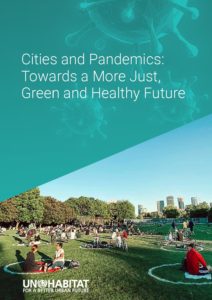Cities and Pandemics Towards a more Just Green and Healthy Future
From the early days of the pandemic, cities have been on the frontline of COVID-19. The spread of the virus globally through travel, trade and mobility meant that a large number of the first detected infections appeared in urban areas, prompting many to question their future. Yet in the months that followed, as the challenges of the pandemic have evolved, so too has our understanding of the disease and its complex relationship with cities. Cities and Pandemics: Towards a More Just, Green and Healthy Future presents an overview of the situation to date and outlines a range of bold measures that could deliver a lasting and sustainable recovery from the current crisis. While COVID-19 continues to produce painful lessons on the shortcomings and failures of many cities to protect their own citizens, it also points the way forward for a better, more sustainable urban future. Some of the most effective responses to the pandemic have been designed and led by cities, building on their ability to concentrate knowledge, resources and infrastructure. From enhanced service provision to the repurposing of local economies to meet the changing needs of residents, urban areas have demonstrated a remarkable capacity for adaptation in the face of this crisis. Moving from a mindset of emergency to recovery, cities have the opportunity to continue to focus on strengthening public health, economic resilience and service access for all. The longstanding divisions and inequalities highlighted by the pandemic mean that a return to normality is no longer enough: what is needed now is transformative change. With inclusive policies, community engagement and a meaningful transition to a more sustainable approach, cities could emerge from the catastrophe of COVID-19 stronger and more resilient than before.
- Downloads 28
- Views 159
- File Size 5.51 MB
- Languages 1


